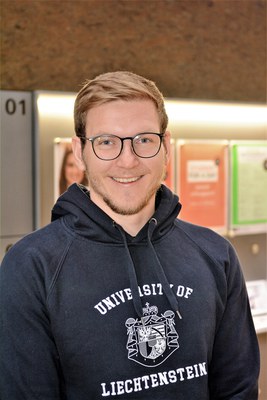The terms Information Systems, Edge Computing, Machine Learning, Artificial Intelligence and Data Science are touted in management journals as the next transformation of the corporate world. In fact, for many people they often just sound like extreme buzzword bingo. As a business information scientist, I can confirm this: in many cases, there is nothing profound behind it.
To bring the abstract of these terms closer to managers or to support computer and software specialists in the feasibility of their ideas in a company, this is exactly why business informatics graduates are more in demand than ever before. Therefore, I would like to explain in this blog why graduates are "most wanted", how you can do your Master in Information Systems at the University of Liechtenstein and why I chose exactly this university.
The University of Liechtenstein keeps its promises
I completed my Bachelor's degree in Economics and Business Administration with a focus on International Economics and Econometrics at the University of Tübingen. In the course of various internships in the automotive industry, I made the experience that existing processes are neither sufficiently changed by collected data nor by particularly innovative ideas. Therefore, I wanted to diversify my education and take it in a more technical direction.
The study program offered by the University of Liechtenstein promised exactly that. Now, shortly before I graduate, I can also say: it kept its word.
"As a Student Ambassador and Class Representative, I leave the University of Liechtenstein with the full conviction that this is a very personal and individual Master's program where learning and practical relevance go hand in hand."
Sascha Gremmelspacher, Master Information Systems
 The Master's program in Information Systems at the University of Vaduz is internationally oriented and therefore held in English. Roughly speaking, it consists of basic/compulsory modules and a selection of four possible elective and specialization modules. These possible specializations can be chosen freely and can strengthen your unique selling point in your professional life. Depending on your personal background and interests, you can delve deeply into these topics and thus expand your expertise. These courses are particularly attractive because they often take place in a small group. This means that the exchange among each other and with the lecturers is very direct.
The Master's program in Information Systems at the University of Vaduz is internationally oriented and therefore held in English. Roughly speaking, it consists of basic/compulsory modules and a selection of four possible elective and specialization modules. These possible specializations can be chosen freely and can strengthen your unique selling point in your professional life. Depending on your personal background and interests, you can delve deeply into these topics and thus expand your expertise. These courses are particularly attractive because they often take place in a small group. This means that the exchange among each other and with the lecturers is very direct.
In the basic/compulsory modules you get a first insight into the topics. Since students bring different experiences with them - some more technical, some more economic - care is taken to ensure that everyone reaches a similar level in order to be able to complete the degree successfully.
The interpersonal counts
For me personally, this "knowledge alignment" was important because, as an economist, I don't have the programming or database experience that a computer science graduate does. Although we started directly into an online semester due to Corona, the exchange between the different groups of graduates was enriching and everyone could benefit.
Of course, with programming, which is unfamiliar at first, learning success doesn't happen right away and depends on your personal will, but what makes learning together here on campus special is the interpersonal aspect.
Learning in group work "How do economists think differently than engineers or computer scientists?" or "How do we find a common language that both sides understand?" is what makes this program so special, apart from the terrific location of the university.
Already in the first three semesters there is group work with companies from the region. This not only allows you to put your learned skills into practice, but also builds up a good network very quickly. The projects change from year to year and involve actual problems or changes that the respective companies have and want to address.
Projects for business partners
As a rule, these practical projects are offered around the topics of the Core Electives in the degree program. These specialization options are optionally the subject areas Business Process Management, Data and Application Security, Data Science and Digital Innovation. The projects are offered by small, local companies as well as global market leaders.
From setting up a web store for a local coffee roasting company or the conceptual development of an electronic warehousing system for the local hospital to an object recognition project based on a machine learning algorithm for an international construction company, you can work on a wide variety of solutions for business. These projects vary in complexity, with different technical or business challenges. Therefore, there is something for every skill level and field of interest.
Master Information Systems as a career booster
These projects not only improve your learned skills, but can also be accelerators for your career. In my case, together with fellow students, I had the opportunity to enter a project in the IT Competition at Hilti AG, which arose from a university module. As the second-place team, each of us received an offer of an internship at Hilti, which shows how sought-after graduates with a background in business and computer science are.
The job offers for information systems specialists and the large number of master's theses written by students at the University of Liechtenstein with companies throughout the region also prove that there is a great demand for know-how and that the career opportunities after a master's degree in information systems at the University of Liechtenstein are very good.
And what happens next for me? After graduating in Information Systems, I will work as an IT and Data Analyst and hope to stay in the Rhine Valley. However, a PhD is not out of the question for me in the next few years.
 Author: Sascha Gremmelspacher
Author: Sascha Gremmelspacher
Master Information Systems (Business Information Systems), Student Ambassador of the University of Liechtenstein, Hilti IT Fellowship Student.
Comes from: Freiburg im Breisgau (Germany)
Studies: MSc Information Systems, previously BSc Economics & Business Administration at the Eberhard-Karls-University of Tübingen, Germany
Why Master Information Systems at the University of Liechtenstein: Excellent choice of focus subjects and proximity to companies
Hobbies: Skiing, mountain sports, fitness, food,
Three tips for those interested in the Master Information Systems:
1. visit our info events to get a personal impression.
2. get in touch with us Student Ambassadors, we are happy to support you.
3. don't be shy about the application process, it would be a pity to miss the chance at the University of Liechtenstein. Application deadline is July 31 für the upcoming winter semester.
Personal note from the University of Liechtenstein: After completing his Master's degree in summer 2022, Sascha Gremmelspacher started his career at Hilti. Sascha died in a tragic avalanche accident on 15 January 2023. We mourn the loss of an exceptional person, an excellent graduate and dedicated Student Ambassador. His memory will always have a firm place with us, even though his death leaves a painful gap.
All information about the English-language Master Information Systems can be found here
Registration for the winter semester 22/23 is possible until July 31.
Specialisations in the Master Information Systems
In their second and third semesters, students can choose among various electives so they can specialise in any of four subject areas:
- The Business Process Management electives focus on the analysis, design, and implementation of business processes and cover topics like strategic alignment, governance, methods, IT, people, and culture.
- The Data and Application Security electives address security essentials by covering the preventive, reactive, and organisational aspects of security.
- The Data Science electives focus on the collection, management, and analysis of data and cover state-of-the-art methods from fields like artificial intelligence and machine learning, including deep learning.
- The Digital Innovation electives covers the development and implementation of novel and original solutions in which the innovation process, and its outcomes is embodied.
Exciting projects
The information systems specialists at the University of Liechtenstein have recently started publishing articles about projects on LinkedIn. Thanks already for sharing!
- Planning for the next city to visit? Let CityBae guide you!
- How to select the most suitable employee for a given task? It’s easy, with SkillPlatform!
Better informed in person
On May 19 from 5 - 7 p.m., the campus will host the Master's Info Night.
- Course teams of the Master's programs will introduce you to the Master's program Information Systems (Business Information Systems)
- Lecturers and students answer all your questions
- Tips for portfolio and application
- Information on careers, living abroad and housing
- Campus Tour with Student Ambassadors
Master Information Systems: a brief review by Prof. Jan vom Brocke
Student Ambassadors: Tips for studying - Master's in Information Systems
Why Business Informatics at the University of Liechtenstein and answers to the 10 most frequently asked questions can be found here in the YouTube playlist.



